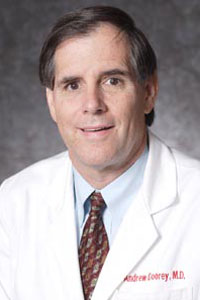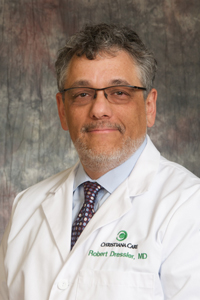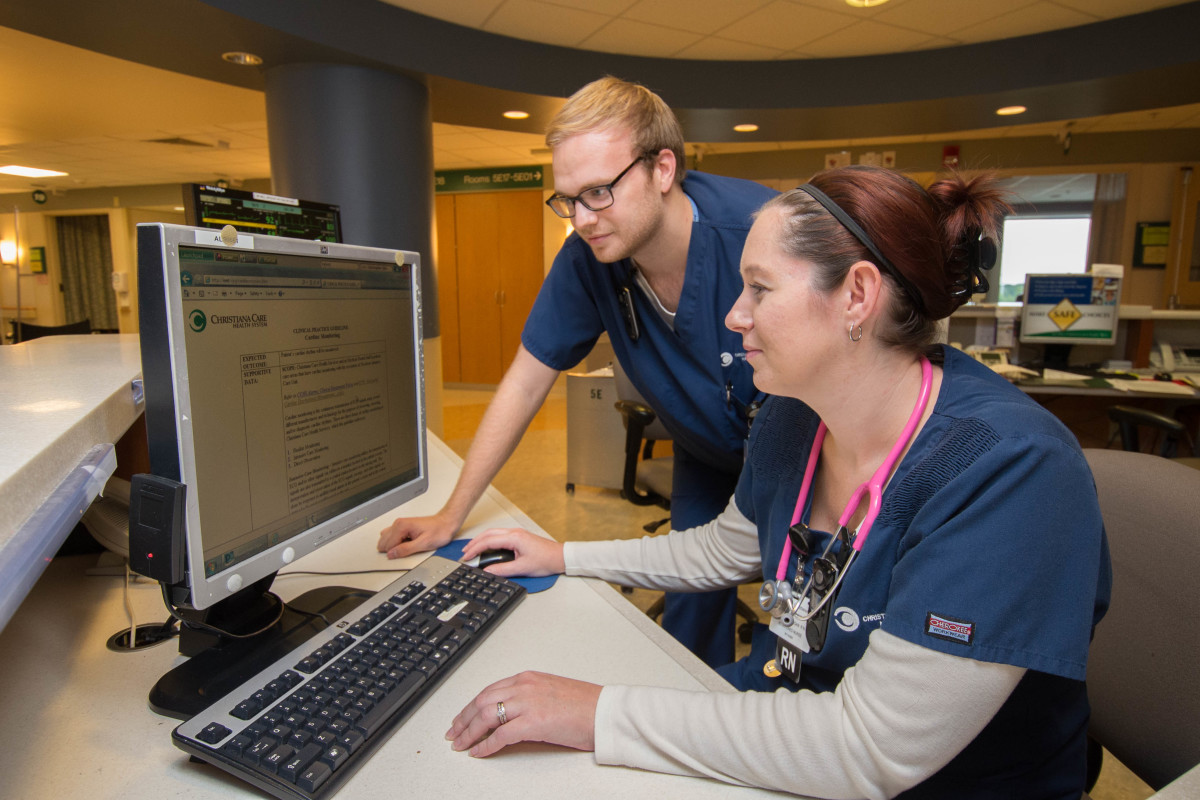ECRI Institute awarded Christiana Care with its 9th annual Health Devices Achievement Award for a new national guideline-driven provider ordering process leading to more appropriate telemetry use in non-intensive care settings.

Interventional cardiologist Andrew J. Doorey, M.D., of Christiana Care Cardiology Consultants and a Value Institute scholar, championed the new process, which achieved an immediate 43 percent reduction in the number of weekly telemetry orders for patients; a 47 percent reduction in the average telemetry hours per monitored patient; a 70 percent reduction in the daily telemetry census and an estimated annual savings of $4.8 million — numbers all sustained to date with no increase in cardiac/respiratory arrest codes or Rapid Response Team calls.
“This redesign shows that we’re good stewards of the resources we have,” Dr. Doorey said. “It helps us provide the right care for the right patient for the right amount of time; and allows staff to focus on their tasks at the bedside without interruption.”
Value-based care
Telemetry use has been widespread at Christiana Care — and in hospitals throughout the nation — dating back to 1999 when wireless “flex” monitoring technology emerged to address a perceived patient safety need and increased demand for monitored beds outside the ICU. While the benefits of telemetry are real in appropriate patients, Doorey said, studies indicate that cardiac and respiratory codes are rare events outside of the ICU, leading an interdisciplinary telemetry team, including Cardiology, Pharmacy, Nursing and Information Technology and led by Robert M. Dressler, M.D., MBA, vice chair of the Department of Medicine, to question whether flex monitoring added value when broadly applied to the non-ICU patient population.
“Reducing telemetry use by 70 percent on a daily basis equates to more than 115 hours of nursing time saved every day at Christiana Care alone. That’s massive — and we didn’t see any increase in harm to patients.”
In one study period, fewer than one percent of alarms from the central telemetry monitoring system were for emergent issues — the vast majority were for technical malfunctions such as loose leads or low batteries. Interruptions caused by these false alarms pull nurses from necessary bedside clinical care duties. Being tethered to a telemetry unit disrupts patient sleep, restricts mobility and increases risk of patient falls, especially among the elderly.
“Responding to false alarms is not only a huge drain on nursing resources, it’s detrimental to the care of the average patient,” said Doorey. “Reducing telemetry use by 70 percent on a daily basis equates to more than 115 hours of nursing time saved every day at Christiana Care alone. That’s massive — and we didn’t see any increase in harm to patients.”
Staff nurses were instrumental in working with the physicians on the protocol, as well as on workflow implementation and technical features of the new tool. The result, said Shirley Moran, MS, RN, NE-BC, director of patient care services, medical nursing, is an all-around success. “It’s simple, easy to use, increases autonomy for nurses and allows patients greater freedom for ambulation, which is so important for getting them through the transition of care.”
Partnership, innovation and expertise
The process redesign involved several key strategies:
- Cardiology-led integration of national guidelines into computer-based telemetry ordering process.
- An interdisciplinary partnership with Pharmacy and the Pharmacy & Therapeutics Committee to review medications that may require cardiac monitoring during administration.
- Redesign of nursing processes for assessing cardiac telemetry discontinuation.
- Changes embedded into the existing workflow for both nursing and physician providers.
- Extensive physician/nurse communication to forge upfront interdisciplinary buy-in.

“In cases where telemetry does not have clinical benefit, we took the ability to order it out of the order set,” Dressler said. “We created a category called ‘other’ so doctors can still order telemetry if they have a bedside clinical concern. It’s limited to 24 hours in duration and can be reordered if clinical concerns persist.”
Doorey and Dressler credit interdisciplinary partnership for the successful sea change in telemetry use. “You cannot overstate the team effort that led to this success. Our nursing collaborators educated us about the many ways that telemetry interrupted and distracted them daily, interfering with patient care,” said Doorey. “This negative effect of telemetry was critical in getting support from the medical staff.
“The IT group was instrumental in their approach to programming simple, logical and visually appealing computer screens to both order and, more importantly, to later automatically discontinue telemetry when appropriate. Pharmacy’s role in the critical evaluation of our drug leveling policy, including the clinically appropriate use of telemetry monitoring with certain medications, was another vital element of the team’s work to ensure that the patients received the care they needed.”
National exposure
Christiana Care published its telemetry management study as a Research Letter in the Sept. 22 issue of JAMA Internal Medicine, attracting coverage by The Wall Street Journal, Reuters Health, Philadelphia Inquirer and Modern Healthcare, speaking requests by the Greater New York Hospital Association and Center for Business Innovation’s upcoming Clinical Alarm Safety Program, and inquiries from physician colleagues at Vanderbilt University Medical Center in Nashville, Aurora Health Care in Milwaukee, Allina Health in Minneapolis, all interested in learning more from Christiana Care physician leaders.

Best practice approach
ECRI Institute is an independent nonprofit that researches best practice approaches to improving patient care. The Award for Excellence in Health Technology Management and Patient Safety will be presented to Christiana Care at a later date.
“We are honored that ECRI Institute has recognized the innovative systems-based approach our team took to improve the value-based care we provide to non-ICU cardiac telemetry patients,” said Dressler. “Championed by Cardiology, our team brought together the expertise to enhance the effectiveness of our bedside clinicians and nurses as caring partners for our patients.”
Other finalists included Banner Health, Cedars-Sinai Medical Center, The Children’s Hospital of Philadelphia, Geisinger Health System and the U.S. Army Western Regional Medical Command.


